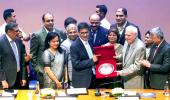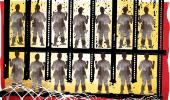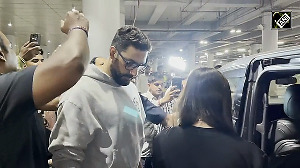He could have blazed a trail that few Indian judges had. It was a missed opportunity of a lifetime, notes Ramesh Menon.

What legacy does Justice Dhananjaya Yeshwant Chandrachud leave behind, and how will history remember him?
He was elevated to the position when there was so much political and social churning in India with imminent dangers plaguing various democratic institutions.
There were many expectations that he would emerge as a shining liberal judge, an articulate dissenter, a defender of liberty and a saviour of democracy. More importantly, he was expected to have the courage to speak truth to power.
There were enough reasons for such an exalted expectation, as he was erudite and had shown an expansive sense of Constitutional jurisprudence in his previous judgments. Moreover, he had a two-year tenure where he could have triggered change that would have consequences for generations.
Few people in history are bestowed with a lifetime opportunity to bring about change and ensure that generations benefit from it. Chandrachud was blessed with such an opportunity. History will spell out what he did not do.

He spoke to adoring audiences, upholding the importance of individual liberty, freedom of speech, religious pluralism, Constitutional safeguards and principles.
But much of what he said in public was missing when judgments were written.
He had the opportunity to step in and restore the autonomy of institutions like the Election Commission when the current political dispensation decided to keep him out of the selection process so that it could appoint whom it wanted. He did not protest. Nor did he protest when they would suggest new names not on the recommended list.
He could have restored a legitimately elected government in Maharashtra. It was not enough for his judgment to say that the governor had erred in his decision to appoint Eknath Shinde as chief minister. The court said it could not restore the Uddhav Thackeray government as he had resigned!
He could have stopped bulldozer justice that BJP governments indulged in, bulldozing houses of those who they thought were criminals. It started in Uttar Pradesh and spread to Haryana, Uttarakhand and Madhya Pradesh.
One of the biggest scandals that rocked the country was the use of Pegasus software for secret surveillance by the government of politicians, journalists and other citizens. Chandrachud did not act, especially when the government defiantly told the court that it would not cooperate.
He led a bench that refused to set up an investigation into the alleged quid promo arrangements that electoral bonds could have facilitated, especially between the ruling party and the government. Various media organisations had, in their investigations, found out that there was a clear connection.
The biggest beneficiaries of the bonds was the BJP.
He could have restored faith and credibility in the electoral process when questions of the Electoral Voting Machines were raised, when the Election Commission was delaying uploading voter turnouts and results, when there was a mismatch between votes casts and counted, and lastly, when ruling party politicians violated the Model Code of Conduct.

Chandrachud said numerous times that undertrials must not be kept in jail for unlimited periods in public speeches and media interviews, but his court did little to make this a norm.
Some undertrials, like 80-year-old social activist Stan Swamy, died in jail in 2021 waiting for bail. So jail continues to be the norm for thousands of prisoners, many of them innocent.
It is ironic that while hardened criminals who are convicted quickly get bail, others who are undertrials have been deliberately kept in jail. Numerous activists, journalists, academics, and dissenters with government policy languish for long periods in jail.
A case in point is student leader Umar Khalid, who has been jailed for over three years without bail.
After many years, only some of those accused in the Bhima Koregaon case were released; the others continue to languish. Professor G N Saibaba, who had a disability of 90 per cent, was in jail for almost ten years before being released, though he was not convicted of any offence. He recently died a broken man.
This was a case in which Chandrachud could have intervened and ensured that justice was delivered to him and thousands of others.

He was part of a bench that dismissed a demand for an investigation into the mysterious death of Justice B H Loya, who was then hearing a fake encounter case in Gujarat. There were allegations that he was being pressured and did not give in. There were inconsistencies in the theory that Loya died of a heart attack in Nagpur to order an investigation.
Recommendations of the collegium for the appointment of judges were openly disregarded by the Executive, which soft-pedalled or rejected them despite lakhs of cases pending in Indian courts.
During his watch, vacancies of judges in high courts increased as the government did not act on recommendations for appointment. He could have slapped contempt charges on the government for not following the recommendations. He did not.

Chandrachud, who invited Prime Minister Narendra D Modi to his house for a puja, raised ethical questions.
Judges are free to follow their faith and should not be targeted for it, but there is no need to wear it on your sleeve. Judges are seen with great respect by the poorest of the poor in the country as their only hope for justice, as they know how the Executive, the Legislature, and media have often failed them.
But when Chandrachud declares that he invoked God's blessings before the Ram Janmabhoomi judgment, one is left wondering where the principles laid down by law and jurisprudence stand. Judgments are written after examining the legal aspects of the case, not by divine intervention.
The Supreme Court verdict allowed the construction of a Ram temple at the disputed site where the Babri Masjid once stood. It said that the 2.77-acre land belonged to Ram Lalla. It asked the Centre to allot a five-acre plot to the Sunni Waqf Board elsewhere to build a mosque.
He allowed a survey at Varanasi's 17th century Gyanvapi mosque to determine whether it was built over a temple. This despite the Places of Worship (Special Provisions) Act, 1991, which mandates maintaining the religious character of places of worship that was prevalent on August 15, 1947.

Chandrachud was part of Constitution benches before he became the chief justice that passed some praise-worthy judgments recognising privacy as a fundamental right, decriminalising homosexuality and adultery, giving women the right to choose whom they wanted to marry, and allowing women to enter the Sabarimala temple in Kerala.
One remarkable one was striking down the scandalous electoral bond scheme. He said it was unconstitutional and arbitrary, having the potential to lead to a quid pro quo arrangement between political parties and donors. However, he refused a probe into it.
He also saw projects like live-streaming court cases, setting up the Supreme Court's data centre and the accessible digital repository of judgments that anyone can access, and ensuring the translation of Supreme Court judgments into Indian languages. This will certainly help the lower courts in the states.
However, in two years, he could have blazed a trail that few Indian judges had. It was a missed opportunity of a lifetime. He will be remembered more for the lost opportunities than his scholarly erudition.
What we need to see now is where he goes after his retirement.
Ramesh Menon, award-winning journalist, educator, documentary film-maker and corporate trainer, is the author of Modi Demystified: The Making Of A Prime Minister.
Feature Presentation: Aslam Hunani/Rediff.com











 © 2025 Rediff.com -
© 2025 Rediff.com -